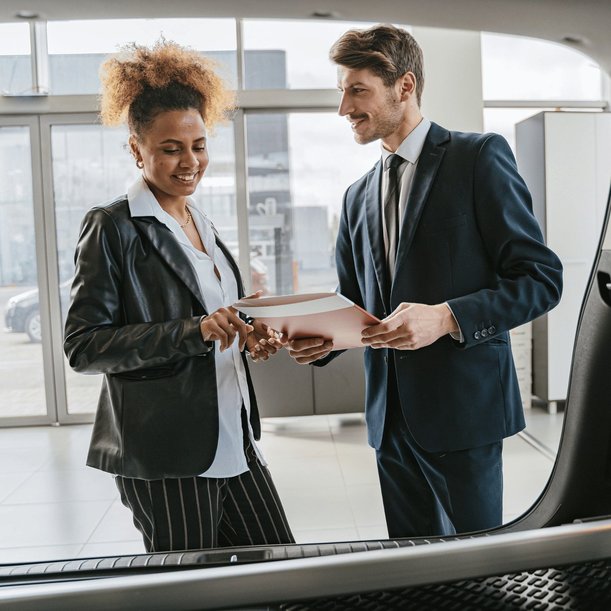
BUYING
Everything You Need to Know About Buying a Used Car
In this article, you'll learn about:
- Setting your price range and identifying the right vehicle
- Conducting thorough research with vehicle history reports and safety ratings
- Evaluating performance and condition of used cars
Last Updated November 27, 2023
9 min read
Buying a used car can be a smart financial decision, offering the benefits of a lower purchase price and slower depreciation compared to new vehicles. However, the process can be daunting, especially if you’re unfamiliar with it. From understanding how to buy a used car to navigating the nuances of vehicle inspection and registration, this guide will provide you with all the essential information.
The Initial Steps: Setting Your Price Range and Identifying the Right Vehicle
Before diving into the world of used cars, it's a good idea to establish a clear price range. This will help you narrow down your options and ensure that you're looking at vehicles that are financially feasible. Consider both the upfront cost and the long-term expenses, such as fuel economy, maintenance, and car insurance.
When choosing the type of vehicle, think about your daily needs. Do you need a fuel-efficient car for city driving or a larger vehicle for family trips? Maybe you're looking for a car with specific features, like advanced safety systems or all-wheel drive. Remember, each car has its unique set of characteristics, from safety ratings to fuel economy, impacting both your driving experience and budget.
Conducting Thorough Research: Vehicle History Reports and Safety Ratings
Once you have a car or a list of cars in mind, the next step is to conduct thorough research. Obtaining a vehicle history report is crucial. This report reveals essential information about the car, including its registration history, whether it has been in any major accidents, and if there are any liens against it. The vehicle identification number (VIN) is key here, as it will help you track the history of the car.
In Canada, it's also wise to check the vehicle information package, which includes details about the car's history and its registration history, particularly if you're buying from a private seller. Don't overlook the importance of safety ratings. These ratings provide insights into how well the vehicle can protect its occupants in the event of a collision, which is vital for your peace of mind.
The Art of the Test Drive: Evaluating the Car's Performance and Condition
Arranging a test drive is a critical step in the used car buying process. This isn't just about seeing if you like driving the car; it's also about assessing its condition and performance. When on a test drive, pay attention to how the car handles, including its acceleration, braking, and steering. Listen for any unusual noises that might indicate mechanical issues.
It's also a good idea to have the vehicle inspected by a professional mechanic. This can be especially important when dealing with a private sale, as it gives you an unbiased assessment of the car's condition. A safety standards certificate, issued by the Ministry of Transportation, is required in some provinces for registering your car, and a thorough inspection can ensure the vehicle meets these standards.
Remember, buying a used car from a car dealership can be different from a private sale. Dealerships often offer certified pre-owned vehicles that have been inspected and come with a warranty. In contrast, a private sale might offer a lower purchase price but requires more diligence on your part to ensure the vehicle's quality and safety.
Understanding the Legal and Financial Aspects: Bill of Sale and Car Insurance
When you're ready to proceed with a purchase, understanding the legal and financial aspects is crucial. The bill of sale is a key document, whether you're buying from a car dealership or through a private sale. This document should include details such as the purchase price, the make and model of the car, the VIN, and the names and addresses of both the buyer and seller. In Canada, this is essential not only for your records but also for registering your car with the Ministry of Transportation.
Car insurance is another critical aspect to consider. Before you drive your new (or new-to-you) vehicle, ensure it is properly insured. Insurance rates can vary based on the car's make, model, safety rating, and even your driving history. It's a good idea to get quotes from multiple insurers to find the best rate for your needs and budget.
Finalizing Your Purchase: Safety Standards Certificate and Registration
Finalizing the purchase of a used car involves several key steps. If you're in a province that requires it, obtaining a safety standards certificate is essential. This certificate confirms that the vehicle meets minimum safety standards on the date it was inspected. You can typically get this certificate from a licensed mechanic.
Registering your car is the final step in the car-buying process. The requirements for registration vary by province but generally involve submitting the bill of sale, proof of insurance, and the safety standards certificate (if required) to the Ministry of Transportation. Be sure to check the specific requirements in your province to ensure a smooth registration process.
Tips for a Successful Purchase: Checklist for Buying a Used Car
To ensure a successful purchase, here’s a quick checklist to keep in mind:
- Set a realistic price range: Consider both the upfront costs and long-term expenses like maintenance and insurance.
- Do thorough research: Use the vehicle identification number (VIN) to obtain a detailed vehicle history report and check the safety ratings.
- Test drive and inspect: Evaluate the car's performance, and have it inspected by a professional to uncover any potential issues.
- Understand the legal and financial aspects: Prepare the necessary documents like the bill of sale and ensure you have adequate car insurance.
- Complete the registration process: Visit the Ministry of Transportation with all the required documents to legally register your vehicle.
Conclusion
Buying a used car can be a rewarding experience, offering financial savings and the pleasure of driving a car suited to your needs and lifestyle. By following these steps, from setting your price range to registering your car, you'll be well-equipped to make an informed decision. Remember, taking the time to do your research, including getting the vehicle inspected and understanding the importance of the vehicle history report, can save you from potential issues down the road. With the right approach, buying a used car can be a smooth, straightforward process, leading you to the perfect vehicle for your adventures on the road.
Try a Roam Car Subscription today
Book your first car subscription in minutes and leave the burdens of traditional car ownership behind.
